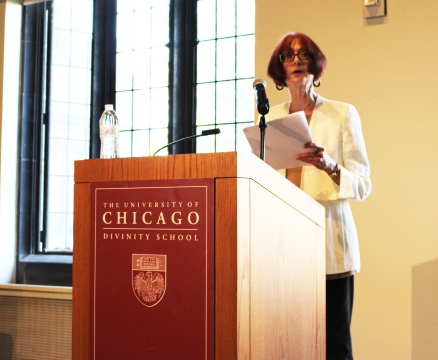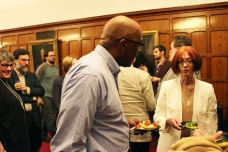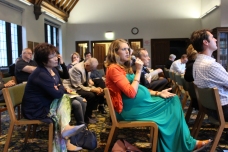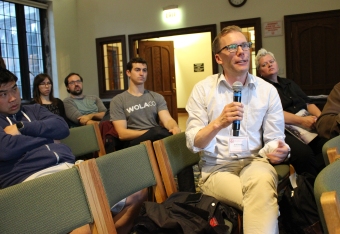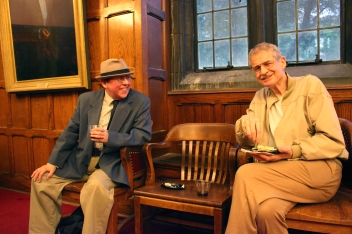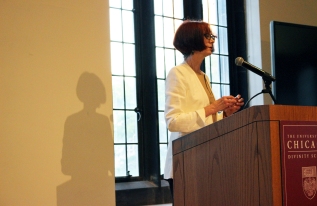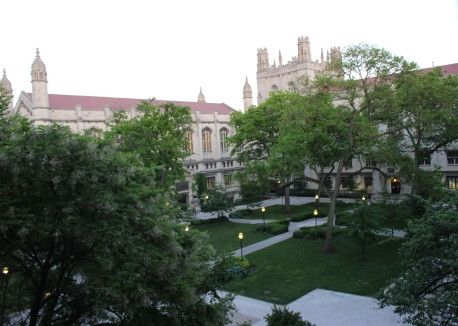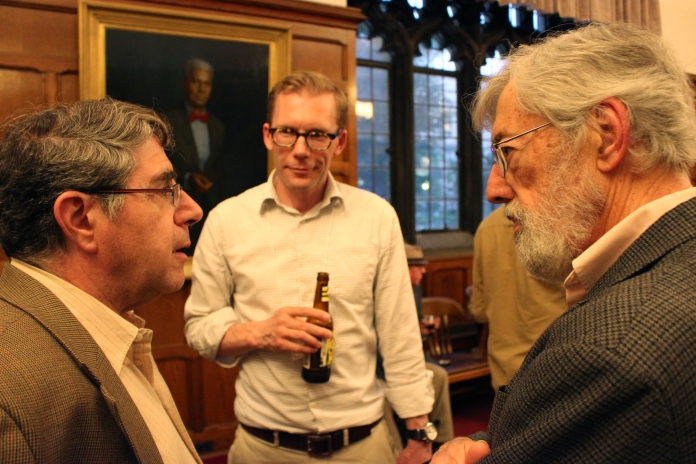On October 14, 2017, Cardinal Blase J. Cupich delivered the Saturday Keynote, “A Consistent Ethic of Solidarity: Transcending Self, Transforming the World,” at our Capstone Conference. We’re reprinting the text in two parts; Part 2 will go up tomorrow. To watch the video and learn more about the conference, click here.
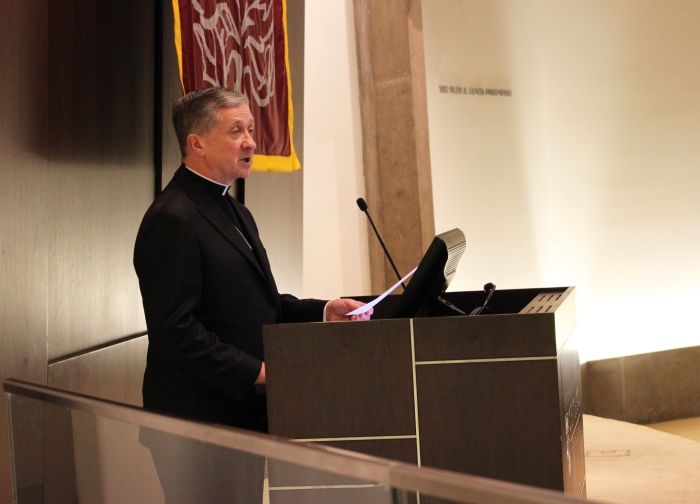
Introduction
Thank you Professor McGinn and all at the University of Chicago and the organizers of this Conference for your warm hospitality and welcome. It really is an honor to be with you this evening and I am very grateful to be invited to participate in this Capstone Conference entitled Virtue, Happiness and the Meaning of Life. This is an important conversation for which – over a 28 month period – you have gathered scholars and professionals from various disciplines to focus on self-transcendence as integral to understanding the interrelationships of virtue, happiness and the meaning of life. Tonight I have been asked to add to that conversation, which I will do by considering how the notion of solidarity found in Catholic Social Teaching, when pursued as a consistent ethic for both individuals and society, might help to flesh out the meaning of self-transcendence, which you rightly state is needed for human flourishing and building up the common good. As I studied the information you sent me on your virtue project, it occurs to me that it shares much in common with the our understanding of solidarity in the Catholic tradition, such that we can benefit from each other in teasing out some points of convergence. And so, I want to begin by pointing out some connections between virtue and solidarity. I will then move on to what I consider some fault lines in the present age that give urgency to pursuing virtue marked by solidarity. I will conclude by suggesting some ways, or maybe priorities, all of us might want to consider as we move forward in solidarity to build up the common good in a way that fosters virtue, happiness and the meaning of life.
The Connection between Virtue and Solidarity
I have to admit I have no hesitation introducing the topic of solidarity into this conversation of virtue, particularly since your starting point is that virtue is not an individual pursuit, practiced and observed only for oneself as a personal improvement project. Rather, virtue has to do with one’s relationships to others and the world. So the ultimate measure of one’s virtue is not only how one personally improves, but how the common good is fostered and furthered by virtuous individuals as a whole. The pursuit of virtue by an individual is about stretching the identity of the person beyond the circumference of one’s body and life as defined by the individual. We often talk about expanding our mind, using more brain cells, but there is another way to increase our capacity as humans and that is by constantly exploring ways to intersect with the lives of others in a way that enhances their lives and the world’s good.
In other words, virtue’s end is solidarity Virtue when rightly pursued aims at uniting humanity through a reawakening of our interdependence as a human family. Pope John Paul II in his groundbreaking encyclical, Sollicitudo Rei Socialis, called humanity to “see the ‘other’-whether a person, people or nation…as our ‘neighbor,’ a ‘helper’ …a sharer, on a par with ourselves, in the banquet of life to which all are equally invited by God.”
It is worth noting that John Paul made a special point in pressing those in position of authority and power to consider their particular responsibility in being virtuous on a global scale, not just for their own sakes or the benefit of the nations they serve. “World leaders,” he urged, need “to recognize that interdependence in itself demands the abandonment of the politics of blocs, the sacrifice of all forms of economic, military or political imperialism, and the transformation of mutual distrust into collaboration. This is precisely the act proper to solidarity among individuals and nations.”[i]
Pursuing virtue in the key of solidarity does not come easily and will cost each of us something. It first of all will require in the words of the Compendium of Catholic Social Teaching “men and women of our day (to) cultivate a greater awareness that they are debtors of the society of which they have become a part. They are debtors because of those conditions that make human existence livable, and because of the indivisible and indispensable legacy constituted by culture, scientific and technical knowledge, material and immaterial goods and by all that the human condition has produced. A similar debt must be recognized in the various forms of social interaction,” the Compendium continues, “so that humanity’s journey will not be interrupted but remain open to present and future generations, all of them called together to share the same gift in solidarity.”[ii] Or, to put it in baseball language, especially appropriate in these days in Chicago, if you are successful, don’t think you hit a home run when all along you were “born on third base.” Or, again, this awareness of what we owe to others will require the kind of humility found in Isaac Newton’s famous saying: “If I have seen further, it is by standing on the shoulders of giants.”[iii]
Fault Lines and Urgency
Let me now say something about the urgency of a consistent ethic of solidarity in view of some fault lines present in society today. As I do so, my hope is that the link between the virtue project that relies on self-transcendence and a consistent ethic of solidarity will become clear.
Radical Polarization
The first obstacle we face today is a radical polarization in society. Our world has changed a great deal in our life time due to many factors that divide humanity. Our era is plagued by global terrorism. It irresponsibly tolerates the exploitation of limited resources and is threatened by climate change, which by its own inertia will imperil future food security as a result of decreased crop yields and result in the abandonment of populated areas due to rising sea levels. As a result of these unchecked forces of economic exploitation and globalization, many people feel excluded, while others are literally excluded as they are left homeless, or forced to migrate, by wars and privation. This has left us fearful of one another in a world marked by great divisions over race, ethnicity, religion and place of origin.
Without oversimplifying, the challenge for us today is not only that there is a division over issues, but humanity is divided. No longer is it that issues are siloed, people are. Their social networks, the media they consult, all operate in silos, bereft of challenge or debate, isolated by differences of opinion or politics, race or social class in a way that obscures our shared humanity, as for instance with the issue of immigration where we are losing the ties that historically have united us as a nation of immigrants. And it is not too strong to say that this sense of disconnectedness is being legitimized not only by voices in the streets but by those in the halls of governance here and around the world, giving rise to xenophobia, nationalism, populism, racial intolerance. All of this makes entire populations more vulnerable to disturbing influences, and centripetal forces which only further divide, while pretending to offer as solutions distorted views of the role of the economy and politics and how we relate to other nations and deal with global conflicts.
Libertarianism
A second fault line is a growing libertarian approach in the present day which is impacting, and I believe is distorting, the way we think about and respond to our politics, the economy and the ecology. In this context, I want to refer you to an excellent paper given by Bishop Robert McElroy in January, 2016 at the Symposium “Erroneous Autonomy: The Dignity of Work,” sponsored by the Institute for Policy Research and Catholic Studies at The Catholic University of America, Washington D.C. In his talk Three Kinds of Erroneous Autonomy he offers analysis of how libertarianism constitutes a compellingly different pathway for humanity at this moment in history which stands at odds with human solidarity. These conflicting pathways are based on two utterly divergent conceptions of the nature of the human person, resulting in two distinct trajectories when it comes to the meaning of economic life, and the goal of politics and the ecology in this era of globalization.
The example of the economy will suffice to make my point about the problematic claims of libertarianism. In fairness, it is important to recognize that many libertarians share with Catholic Social Teaching a respect for human dignity. Human dignity anchors their insistence on human freedom. They rightly argue that this dignity is not given by society but by the Creator and therefore freedom, self-determination and all other human rights are inalienable, echoing the principles in the documents of democracy. However, advocates of a libertarian philosophy stop short in considering what this means. They fail to uphold that since this dignity belongs to all human beings in common, it implies the solidarity of all peoples. By uncoupling human dignity from the solidarity it implies, libertarians move in a direction that has enormous consequences for the meaning of economic life. Let me put it more sharply:
- In our understanding of solidarity, the human person seeks and claims an integral development, morally, spiritually and emotionally, which is joined intrinsically to the communities that sustain him or her. For libertarians, the human person is the autonomous individual, man the producer and man the consumer.
- For advocates of solidarity, in this age of growing globalization, inclusion and economic security for all are measures of economic health, requiring global structures that help mold the forces of market capitalism to advance solidarity and dignity for all; while in contrast the libertarian has a one-dimensional measure of economic growth proposed for decision making, advocating that market forces left to themselves are the best arbiters of economic progress. It is for this reason that when it comes to politics, while solidarity seeks the common good, the libertarian advances a politics that seeks to maximize the freedom of markets and individual choice.
Challenges of Communications Technology
A final consideration as we think about the challenges of creating a greater sense of solidarity is the ongoing development in communications technology and its impact on the youth of the world. This technology is moving us and particularly young people to greater isolation while giving the impression of linking us. We can shield ourselves from the demands of others by the click of a key or by not responding on a device which we use to limit our interaction with the world. For many young people their smart phone is the only portal for interaction, but also information which they will believe. But, it is also the case that less personal and more electronic means of communication have gained a foothold in the minds of young people globally when it comes to news they believe over-against human encounters. A menacing instance of this, of course, is the radicalization of young people who are being fed ideologies of hate, a manipulation that leads to the acts of terrorism we are witnessing today. Additionally, as communications technology continues to flatten the world as Thomas Friedman describes, there is an even more ominous threat looming when it comes to the youth of the world. While it is true that many in our era have been lifted out of poverty, the numbers of people, especially children not just poor but trapped in poverty and exclusion, who are migrants, living in exile from their homes because of wars and famine, are staggering. Global communications surely conveys a certain sense that we are united in this world but many children living in abject poverty have good reason to believe that the world cares little about them. We may be together on this planet but they are receiving the message that they are not one of us. Living with no hope yet tantalized by what they see in the world of opulence, they will be challenged to deal with rising expectations in a non-violent way.
But, as a pastor working with families and parents as they raise their children, I am concerned about how this phenomenon of communicating through modern technology is also impacting family life, particularly the way youth and adults within a family relate, communicate and trust each other. Some years ago, a diplomat was telling me of a conversation he had with his daughter, trying to explain to her why he could not attend her dance recital, having been charged with serious negotiations impacting world peace that would force him to travel abroad. She was unconvinced, unsympathetic and hurt; what he said was not credible. But then, some days later she saw a news interview her father gave on a website explaining the importance of the meeting that took him away from home. She called her father to tell him she now understood because she saw it on a website channel. The moral of the story, if you want to talk to your children and have them believe you, send them a link to your YouTube upload.
Seriously though, I am convinced that we should consider the impact of the ever developing communications technology on our world especially our youth, which I am describing here, as a wakeup call. A good place to start, it seems to me, is to pay more attention to mining the results of your value project and the tradition of solidarity for resources that might challenge this narrow approach to communication and offer one that is more integrated and authentically human.
In fact, faced in this urgent moment with seemingly intractable challenges we face today, we would have much to gain by exploring how your advocacy of promoting virtue through self-transcendence and the consistent ethic of solidarity I speak about today have the potential of informing each other to better contribute to human flourishing and the common good. My explanation of a consistent ethic of solidarity as aiming at uniting humanity through a reawakening of our interdependence as a human family, while not exhaustive of what Candace Vogler describes as your project in her piece featured on your virtue blog, seems to have a great deal in common. Let me quote just a bit of it here: “self-transcendence,” she writes, “shows itself when I live my life and understand my life as essentially connected to a good beyond my own comfort, the security and comfort of my friends and immediate family, the goods of personal achievement, success, self-expression, and the like. My life is lived through participation in a good that goes beyond personal achievement, expression, security and comfort, beyond even the need to promote those goods for members of my intimate circle. I work on behalf of bettering the community in ways that will help strangers … I have a self-transcendent orientation to the living of my daily life. My own life is a part of some good crucial to good life more generally, as best I can understand, serve, and embody that larger good.”
[i] John Paul II, Sollicitudo Rei Socialis, 39.
[ii] The Compendium of the Social Doctrine of the Church.
[iii] Newton, Isaac. “Letter from Sir Isaac Newton to Robert Hooke”. Historical Society of Pennsylvania. Retrieved 7 August 2016.







